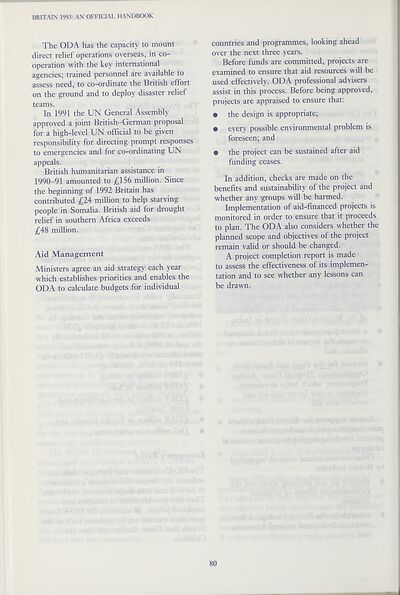Download files
Complete book:
Individual page:
Thumbnail gallery: Grid view | List view

BRITAIN 1993: AN OFFICIAL HANDBOOK
The ODA has the capacity to mount
direct relief operations overseas, in co¬
operation with the key international
agencies; trained personnel are available to
assess need, to co-ordinate the British effort
on the ground and to deploy disaster relief
teams.
In 1991 the UN General Assembly
approved a joint British-German proposal
for a high-level UN official to be given
responsibility for directing prompt responses
to emergencies and for co-ordinating UN
appeals.
British humanitarian assistance in
1990-91 amounted to £156 million. Since
the beginning of 1992 Britain has
contributed £24 million to help starving
people in Somalia. British aid for drought
relief in southern Africa exceeds
£48 million.
Aid Management
Ministers agree an aid strategy each year
which establishes priorities and enables the
ODA to calculate budgets for individual
countries and programmes, looking ahead
over the next three years.
Before funds are committed, projects are
examined to ensure that aid resources will be
used effectively. ODA professional advisers
assist in this process. Before being approved,
projects are appraised to ensure that:
• the design is appropriate;
• every possible environmental problem is
foreseen; and
• the project can be sustained after aid
funding ceases.
In addition, checks are made on the
benefits and sustainability of the project and
whether any groups will be harmed.
Implementation of aid-financed projects is
monitored in order to ensure that it proceeds
to plan. The ODA also considers whether the
planned scope and objectives of the project
remain valid or should be changed.
A project completion report is made
to assess the effectiveness of its implemen¬
tation and to see whether any lessons can
be drawn.
80
The ODA has the capacity to mount
direct relief operations overseas, in co¬
operation with the key international
agencies; trained personnel are available to
assess need, to co-ordinate the British effort
on the ground and to deploy disaster relief
teams.
In 1991 the UN General Assembly
approved a joint British-German proposal
for a high-level UN official to be given
responsibility for directing prompt responses
to emergencies and for co-ordinating UN
appeals.
British humanitarian assistance in
1990-91 amounted to £156 million. Since
the beginning of 1992 Britain has
contributed £24 million to help starving
people in Somalia. British aid for drought
relief in southern Africa exceeds
£48 million.
Aid Management
Ministers agree an aid strategy each year
which establishes priorities and enables the
ODA to calculate budgets for individual
countries and programmes, looking ahead
over the next three years.
Before funds are committed, projects are
examined to ensure that aid resources will be
used effectively. ODA professional advisers
assist in this process. Before being approved,
projects are appraised to ensure that:
• the design is appropriate;
• every possible environmental problem is
foreseen; and
• the project can be sustained after aid
funding ceases.
In addition, checks are made on the
benefits and sustainability of the project and
whether any groups will be harmed.
Implementation of aid-financed projects is
monitored in order to ensure that it proceeds
to plan. The ODA also considers whether the
planned scope and objectives of the project
remain valid or should be changed.
A project completion report is made
to assess the effectiveness of its implemen¬
tation and to see whether any lessons can
be drawn.
80
Set display mode to:
![]() Universal Viewer |
Universal Viewer | ![]() Mirador |
Large image | Transcription
Mirador |
Large image | Transcription
The item on this page appears courtesy of Office for National Statistics and may be re-used under the Open Government Licence for Public Sector Information.
| Britain and UK handbooks > Britain: An official handbook > 1993 > (98) |
|---|
| Permanent URL | https://digital.nls.uk/204738963 |
|---|
| Attribution and copyright: |
|
|---|---|
| Description | 'Britain: An official handbook' was produced annually by the Central Office of Information from 1954-1998. There are 44 volumes available here to view. |
|---|---|
| Shelfmark | GII.11 |
| Description | Three titles produced by the British Government from 1954-2005 describing 'how Britain worked'. They are: 'Britain: An official handbook' (1954-1998), 'Britain: The official yearbook of the United Kingdom' (1999-2001), and 'UK: The official yearbook of the United Kingdom of Great Britain and Northern Ireland' (2002-2005). These 50 reports provide an overview of Britain's economic, social and cultural affairs, its environment, international relations, and the systems of government. They give an impartial summary of government policies and initiatives, and explain how public services are organised. |
|---|---|
| Additional NLS resources: |
|

